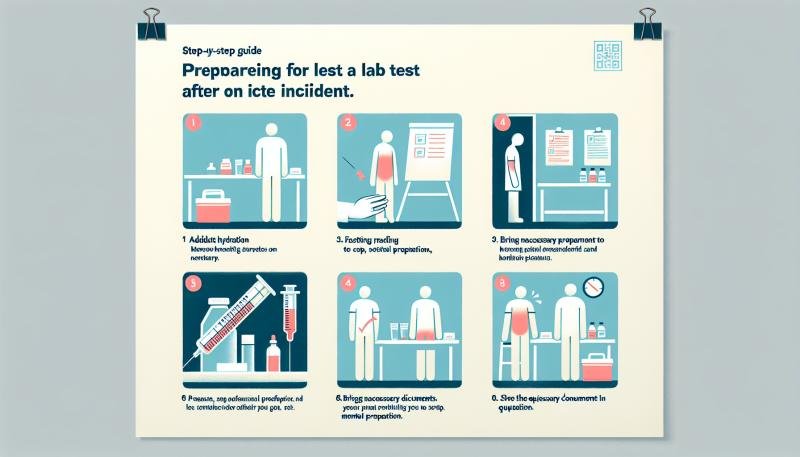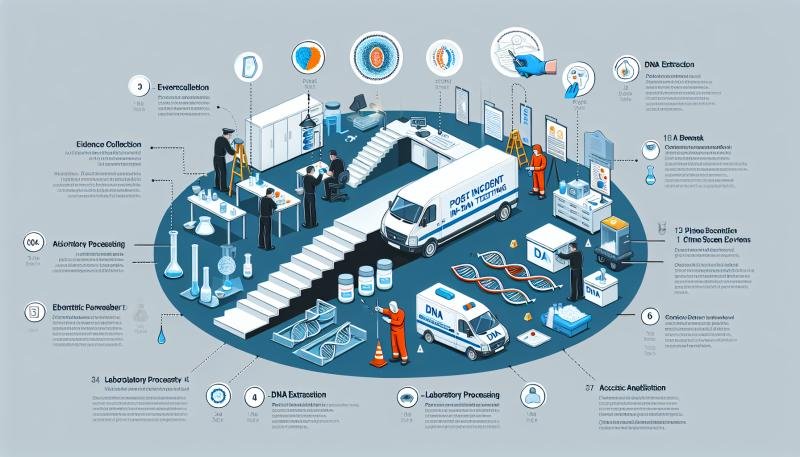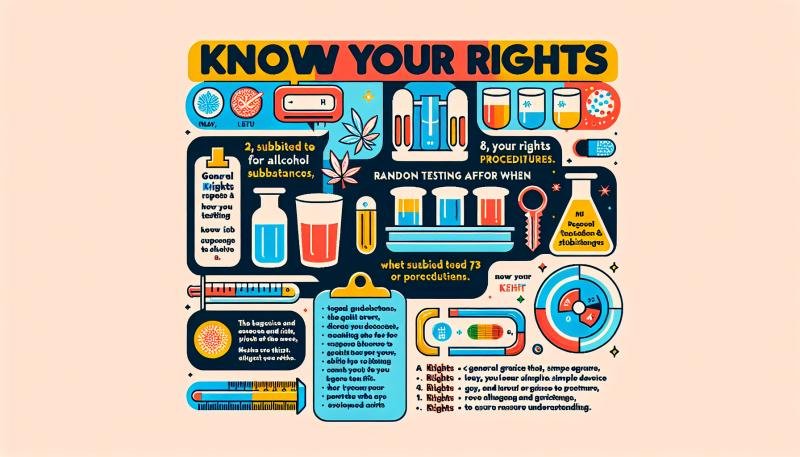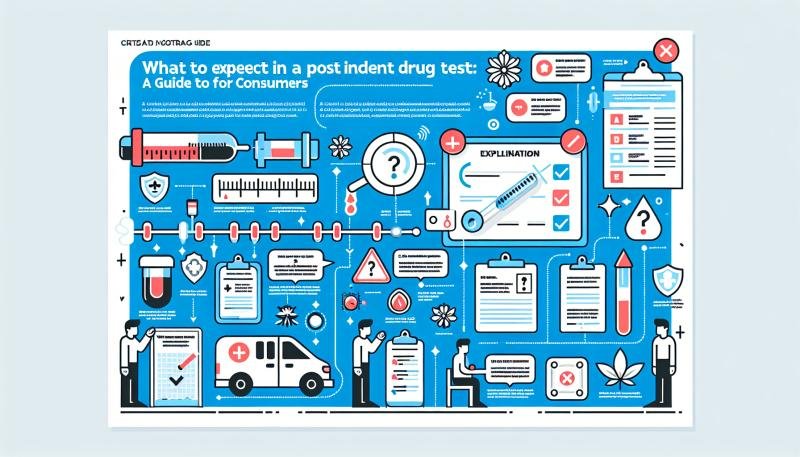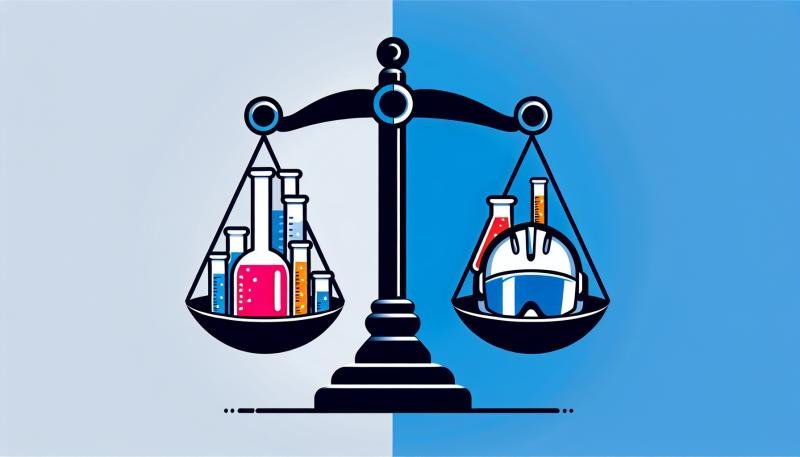
Specific Populations Articles
Random Testing Demystified: What Consumers Need to Know
Random testing is a crucial part of quality assurance across...
Read MoreConsumer Guide: Preparing for a Lab Test After an Incident
When life’s unexpected incidents occur, one might find themselves facing...
Read MorePost-Incident DNA Testing: How It Works and When It�s Required
In today’s fast-paced world, unforeseen incidents can happen, propelling individuals...
Read MoreKnow Your Rights: Navigating Random Testing for Alcohol and Substances
In today’s world, workplace safety and compliance play a crucial...
Read MoreWhat to Expect in a Post-Incident Drug Test: A Guide for Consumers
In the world of safety and compliance, post-incident drug testing...
Read MoreUnderstanding the Importance of Random Drug and Alcohol Testing for Personal Safety
In today�s fast-paced world, ensuring personal safety and maintaining a...
Read MoreRequesting a random drug test for yourself or a family member can be an important decision, often made for various personal, legal, or health-related reasons. Here’s what you need to know:
Self-Requesting a Drug Test
- Convenience: Many testing facilities allow individuals to request their own drug test without a doctor’s order. This can be done through online portals or by directly contacting a testing center.
- Types of Tests: You can choose from a variety of test types such as urine, hair, saliva, or blood tests. Each tests for different substances and detection periods.
- Privacy: These tests are confidential, and you�ll receive the results directly.
Requesting a Test for a Family Member
- Consent: Generally, you need the family member’s consent to legally conduct a drug test since privacy laws protect individuals.
- Minors: If the family member is a minor, parental consent is usually sufficient. Check your local regulations for specifics.
- Family Services: Some family services offer counseling and drug testing as part of their programs, providing a structured approach.
Seeking Professional Guidance
If you’re unsure about the process or need more information, consulting with a healthcare professional or counselor can provide additional perspective and support.
After an incident involving drugs or alcohol, it’s crucial to get tested promptly to ensure accurate results and address any immediate concerns. Here’s what you need to know about the timing of drug and alcohol tests:
Types of Tests and Their Timing
- Alcohol Testing: Blood, breath, and saliva tests can detect alcohol almost immediately after consumption. It’s best to test as soon as possible after the incident.
- Urine Drug Testing: These tests are commonly used for initial screenings. They can typically detect drug use within a few hours to a few days, depending on the substance.
- Hair Follicle Drug Testing: These provide a longer detection window, generally from seven days to 90 days after use, but aren’t suitable for immediate post-incident testing.
- Oral Fluid Drug Testing: Effective within minutes to about 48 hours afterward, these tests are suitable for recent usage detection.
When Should You Test?
The ideal time to get a test depends on the type of substance involved and the test method available. For immediate results, breath and oral fluid tests are usually the most effective. Always consider the specific circumstances and the potential implications when choosing a test.
Additional Considerations
- Ensure the testing method is appropriate for the substance in question.
- Consult with a healthcare professional if you’re unsure about the best testing option for your situation.
It’s essential to act promptly after any incident to ensure test accuracy and take appropriate action based on the results.
Scheduling an emergency drug test can be crucial in specific situations. Here is a step-by-step guide to help you through the process:
Steps to Schedule an Emergency Drug Test:
- Identify the Type of Test Required:
Determine whether you need a urine, hair, blood, or saliva test, as some testing centers may specialize in certain types.
- Find a Local Testing Center:
Use online directories or search engines to locate a nearby facility. It’s important to ensure they offer emergency testing services.
- Contact the Testing Center:
Call ahead to confirm their availability for emergency services and inquire about their hours of operation.
- Gather Necessary Information:
Have personal identification and payment information ready. Check if you need a referral or if the test can be self-ordered.
- Schedule the Test:
Upon confirmation of availability, schedule your appointment. Most centers accommodate same-day testing for emergencies.
- Prepare for the Test:
Follow any pre-test instructions provided by the center to ensure accurate results.
- Arrive on Time:
Reach the testing center a few minutes early with all necessary documentation.
Considerations
- Inquire about result turnaround times if you need prompt results.
- Check if the testing center follows proper privacy standards to protect your personal information.
- Some tests may have specific preparation guidelines; follow them closely.
Being prepared with this information can help streamline the process and get you the results you need swiftly.
Drug testing after an accident or event is an important tool to determine if substances played a role in the occurrence. However, its effectiveness can vary depending on several factors.
Factors Affecting Effectiveness
- Timing: The sooner a test is conducted after an incident, the more accurate the results. Substances metabolize at different rates, impacting detection.
- Type of Test: Various tests (urine, blood, hair) have different detection windows and accuracy levels. Each type is effective for specific substances and timeframes.
- Substance Involved: Some drugs leave the system quickly while others linger, affecting test results. Understanding these differences is crucial for effectiveness.
Benefits of Post-Accident Testing
- Identifying Causes: Helps in determining whether impairment was a factor in the accident.
- Promoting Safety: Encourages a safe environment by discouraging drug use prior to tasks requiring focus.
- Legal and Insurance Claims: Provides evidence that can be critical during investigations.
Considerations for Consumers
Individuals should consent to testing, and results should be part of a broader investigative process rather than the sole determinant of fault or responsibility. Additionally, privacy should be respected, and any positive results handled with confidentiality and care.
Understanding how far back drug or alcohol use can be detected depends on several factors including the substance type, test method, and the individual�s metabolism. Below is an overview of different testing methods and their typical detection windows:
Urine Testing
- Drugs: Most common drugs can be detected for several days. For example, marijuana may be detected for up to 30 days in chronic users.
- Alcohol: Typically detectable for 12-48 hours, though certain tests like Ethyl Glucuronide (EtG) can identify alcohol use up to 80 hours prior.
Blood Testing
- Drugs: Generally reflects recent use, with most substances detectable for minutes to hours.
- Alcohol: Detectable for up to 12 hours. Blood tests are often used in legal or accident-related investigations.
Hair Testing
- Drugs and Alcohol: Offers a longer detection window, typically up to 90 days. This method shows a pattern of substance use rather than recent consumption.
Saliva Testing
- Drugs: Detects recent use, usually up to 24-48 hours.
- Alcohol: Detectable for 1-5 days, but less common compared to other methods.
Note:
Several factors affect detection times, such as frequency of use and body fat composition. Always consult a healthcare professional for personalized advice.
There are many scenarios where you might consider using test results as evidence in a personal matter, such as family disputes, paternity questions, or health-related discussions. Here are some points to consider:
Types of Test Results
- Medical Tests: Blood tests, genetic tests, or other diagnostic results from healthcare providers.
- Environmental Tests: Tests measuring substances like radon or mold in your home.
- Consumer Product Tests: Results from testing items such as water quality or food safety.
Importance of Accuracy and Authenticity
To ensure the reliability of test results, they must be conducted and documented properly. It’s essential that:
- The tests are carried out by certified professionals or reputable labs.
- Results are documented clearly, showing method and date.
Legal Considerations
Using test results as evidence may involve certain legal standards:
- Consulting with a legal professional can clarify admissibility.
- Privacy laws may restrict how medical or personal information is shared.
While test results can strengthen your position in personal matters, it�s crucial to handle them thoughtfully and legally.
Random Testing Demystified: What Consumers Need to Know
Random testing is a crucial part of quality assurance across...
Read MoreConsumer Guide: Preparing for a Lab Test After an Incident
When life’s unexpected incidents occur, one might find themselves facing...
Read MorePost-Incident DNA Testing: How It Works and When It�s Required
In today’s fast-paced world, unforeseen incidents can happen, propelling individuals...
Read MoreKnow Your Rights: Navigating Random Testing for Alcohol and Substances
In today’s world, workplace safety and compliance play a crucial...
Read MoreWhat to Expect in a Post-Incident Drug Test: A Guide for Consumers
In the world of safety and compliance, post-incident drug testing...
Read MoreUnderstanding the Importance of Random Drug and Alcohol Testing for Personal Safety
In today�s fast-paced world, ensuring personal safety and maintaining a...
Read MoreRequesting a random drug test for yourself or a family member can be an important decision, often made for various personal, legal, or health-related reasons. Here’s what you need to know:
Self-Requesting a Drug Test
- Convenience: Many testing facilities allow individuals to request their own drug test without a doctor’s order. This can be done through online portals or by directly contacting a testing center.
- Types of Tests: You can choose from a variety of test types such as urine, hair, saliva, or blood tests. Each tests for different substances and detection periods.
- Privacy: These tests are confidential, and you�ll receive the results directly.
Requesting a Test for a Family Member
- Consent: Generally, you need the family member’s consent to legally conduct a drug test since privacy laws protect individuals.
- Minors: If the family member is a minor, parental consent is usually sufficient. Check your local regulations for specifics.
- Family Services: Some family services offer counseling and drug testing as part of their programs, providing a structured approach.
Seeking Professional Guidance
If you’re unsure about the process or need more information, consulting with a healthcare professional or counselor can provide additional perspective and support.
After an incident involving drugs or alcohol, it’s crucial to get tested promptly to ensure accurate results and address any immediate concerns. Here’s what you need to know about the timing of drug and alcohol tests:
Types of Tests and Their Timing
- Alcohol Testing: Blood, breath, and saliva tests can detect alcohol almost immediately after consumption. It’s best to test as soon as possible after the incident.
- Urine Drug Testing: These tests are commonly used for initial screenings. They can typically detect drug use within a few hours to a few days, depending on the substance.
- Hair Follicle Drug Testing: These provide a longer detection window, generally from seven days to 90 days after use, but aren’t suitable for immediate post-incident testing.
- Oral Fluid Drug Testing: Effective within minutes to about 48 hours afterward, these tests are suitable for recent usage detection.
When Should You Test?
The ideal time to get a test depends on the type of substance involved and the test method available. For immediate results, breath and oral fluid tests are usually the most effective. Always consider the specific circumstances and the potential implications when choosing a test.
Additional Considerations
- Ensure the testing method is appropriate for the substance in question.
- Consult with a healthcare professional if you’re unsure about the best testing option for your situation.
It’s essential to act promptly after any incident to ensure test accuracy and take appropriate action based on the results.
Scheduling an emergency drug test can be crucial in specific situations. Here is a step-by-step guide to help you through the process:
Steps to Schedule an Emergency Drug Test:
- Identify the Type of Test Required:
Determine whether you need a urine, hair, blood, or saliva test, as some testing centers may specialize in certain types.
- Find a Local Testing Center:
Use online directories or search engines to locate a nearby facility. It’s important to ensure they offer emergency testing services.
- Contact the Testing Center:
Call ahead to confirm their availability for emergency services and inquire about their hours of operation.
- Gather Necessary Information:
Have personal identification and payment information ready. Check if you need a referral or if the test can be self-ordered.
- Schedule the Test:
Upon confirmation of availability, schedule your appointment. Most centers accommodate same-day testing for emergencies.
- Prepare for the Test:
Follow any pre-test instructions provided by the center to ensure accurate results.
- Arrive on Time:
Reach the testing center a few minutes early with all necessary documentation.
Considerations
- Inquire about result turnaround times if you need prompt results.
- Check if the testing center follows proper privacy standards to protect your personal information.
- Some tests may have specific preparation guidelines; follow them closely.
Being prepared with this information can help streamline the process and get you the results you need swiftly.
Drug testing after an accident or event is an important tool to determine if substances played a role in the occurrence. However, its effectiveness can vary depending on several factors.
Factors Affecting Effectiveness
- Timing: The sooner a test is conducted after an incident, the more accurate the results. Substances metabolize at different rates, impacting detection.
- Type of Test: Various tests (urine, blood, hair) have different detection windows and accuracy levels. Each type is effective for specific substances and timeframes.
- Substance Involved: Some drugs leave the system quickly while others linger, affecting test results. Understanding these differences is crucial for effectiveness.
Benefits of Post-Accident Testing
- Identifying Causes: Helps in determining whether impairment was a factor in the accident.
- Promoting Safety: Encourages a safe environment by discouraging drug use prior to tasks requiring focus.
- Legal and Insurance Claims: Provides evidence that can be critical during investigations.
Considerations for Consumers
Individuals should consent to testing, and results should be part of a broader investigative process rather than the sole determinant of fault or responsibility. Additionally, privacy should be respected, and any positive results handled with confidentiality and care.
Understanding how far back drug or alcohol use can be detected depends on several factors including the substance type, test method, and the individual�s metabolism. Below is an overview of different testing methods and their typical detection windows:
Urine Testing
- Drugs: Most common drugs can be detected for several days. For example, marijuana may be detected for up to 30 days in chronic users.
- Alcohol: Typically detectable for 12-48 hours, though certain tests like Ethyl Glucuronide (EtG) can identify alcohol use up to 80 hours prior.
Blood Testing
- Drugs: Generally reflects recent use, with most substances detectable for minutes to hours.
- Alcohol: Detectable for up to 12 hours. Blood tests are often used in legal or accident-related investigations.
Hair Testing
- Drugs and Alcohol: Offers a longer detection window, typically up to 90 days. This method shows a pattern of substance use rather than recent consumption.
Saliva Testing
- Drugs: Detects recent use, usually up to 24-48 hours.
- Alcohol: Detectable for 1-5 days, but less common compared to other methods.
Note:
Several factors affect detection times, such as frequency of use and body fat composition. Always consult a healthcare professional for personalized advice.
There are many scenarios where you might consider using test results as evidence in a personal matter, such as family disputes, paternity questions, or health-related discussions. Here are some points to consider:
Types of Test Results
- Medical Tests: Blood tests, genetic tests, or other diagnostic results from healthcare providers.
- Environmental Tests: Tests measuring substances like radon or mold in your home.
- Consumer Product Tests: Results from testing items such as water quality or food safety.
Importance of Accuracy and Authenticity
To ensure the reliability of test results, they must be conducted and documented properly. It’s essential that:
- The tests are carried out by certified professionals or reputable labs.
- Results are documented clearly, showing method and date.
Legal Considerations
Using test results as evidence may involve certain legal standards:
- Consulting with a legal professional can clarify admissibility.
- Privacy laws may restrict how medical or personal information is shared.
While test results can strengthen your position in personal matters, it�s crucial to handle them thoughtfully and legally.


